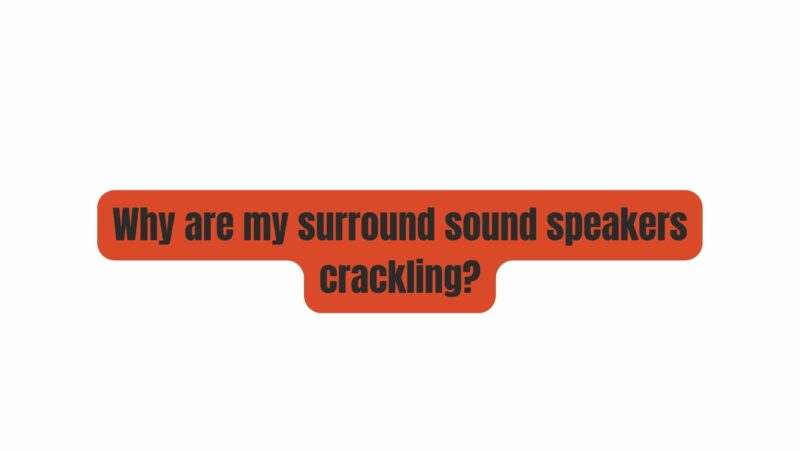Crackling sounds coming from your surround sound speakers can be both frustrating and disruptive to your audio experience. Whether you’re enjoying a movie night or immersing yourself in your favorite music, crackling sounds can detract from the overall enjoyment. In this article, we will delve into the common causes of crackling in surround sound speakers and offer practical solutions to diagnose and resolve this issue.
1. Loose or Damaged Wiring
A. Loose Connections: One of the most common reasons for crackling sounds in speakers is loose wiring or connections. Over time, speaker wires can become loose due to vibrations, accidental tugs, or improper installation. When wires are not securely connected to the speaker terminals, amplifier, or receiver, it can result in intermittent electrical contact and crackling noises.
Solution: Ensure that all speaker connections, including the wire terminals, are secure. Disconnect and reconnect the wires if necessary, making sure that there are no loose strands of wire touching each other.
B. Damaged Wiring: Physical damage to speaker wires, such as fraying or cuts in the insulation, can expose the conductive wire underneath. This exposure can lead to electrical interference and crackling sounds.
Solution: Inspect the speaker wires for any visible damage and replace any compromised cables. Using high-quality, properly insulated speaker wire can also help prevent future issues.
2. Dust and Debris
A. Accumulation on Diaphragms: Dust and debris can accumulate on the speaker diaphragms over time, affecting their movement and causing crackling or popping sounds during playback.
Solution: Regularly clean the speaker diaphragms using a soft brush or compressed air to remove dust and debris. Be gentle to avoid damaging the diaphragms.
3. Amplifier or Receiver Issues
A. Overloading the Amplifier: If your amplifier or receiver is pushed to its limits, it may struggle to deliver clean power to the speakers. This can result in distorted audio and crackling sounds, particularly when playing at high volumes.
Solution: Ensure that your amplifier or receiver is not being overloaded by the demands of the speakers. Consider upgrading to a more powerful amplifier if needed, or reduce the volume to a level within the amplifier’s capabilities.
B. Amplifier Distortion: Amplifier distortion can also lead to crackling sounds. Check if the amplifier is producing a clean signal by listening for distortion in both speakers.
Solution: Lower the volume to a moderate level and listen for any distortion. If you hear crackling or distortion even at lower volumes, it may indicate an issue with the amplifier. Consult a professional technician for repair or replacement.
4. Speaker Damage
A. Diaphragm Damage: Physical damage to the speaker diaphragms, such as punctures, tears, or dents, can result in crackling sounds. These damages affect the speaker’s ability to produce clean sound.
Solution: Inspect the diaphragms for any visible damage. If you find issues, consider repairing or replacing the affected speakers.
B. Voice Coil Damage: Damage to the voice coil, which is responsible for moving the diaphragm, can also cause crackling sounds. This damage can result from overheating or physical trauma.
Solution: If you suspect voice coil damage, consult a professional technician for diagnosis and potential repair or replacement.
5. Environmental Factors
A. Humidity: High levels of humidity can affect speaker performance and lead to crackling sounds, especially if moisture penetrates the speaker components.
Solution: Control the humidity in your listening environment using a dehumidifier if necessary. Store speakers in a dry location when not in use.
B. Temperature: Extreme temperature fluctuations can cause speaker materials to expand and contract, potentially leading to crackling noises.
Solution: Maintain a stable temperature in your listening area, avoiding rapid changes in temperature that can stress the speaker components.
6. Signal Interference
A. Interference from Other Electronic Devices: Nearby electronic devices, such as cell phones, Wi-Fi routers, or microwave ovens, can emit electromagnetic interference that affects the speaker’s performance.
Solution: Relocate electronic devices that may be causing interference or use shielded speaker cables to reduce the impact of electromagnetic interference.
7. Aging Speakers
Over time, speaker components can deteriorate naturally due to wear and tear. This can lead to crackling sounds as the speaker’s performance declines with age.
Solution: Consider replacing speakers that are significantly aged and have reached the end of their lifespan. Newer speakers often offer improved sound quality and reliability.
In Conclusion
Crackling sounds from your surround sound speakers can be caused by various factors, including loose or damaged wiring, dust and debris, amplifier issues, speaker damage, environmental factors, signal interference, and aging speakers. By identifying the root cause of the crackling and implementing the appropriate solutions, you can restore the audio quality of your surround sound system and enjoy a clear and immersive listening experience. Regular maintenance and care of your speakers can also help prevent crackling issues in the future, ensuring that your audio setup continues to provide exceptional sound quality.


